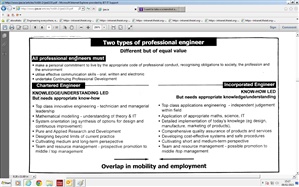

James Walker:
I experienced being looked down on by the Civils and Structures CEngs but always consoled myself with the knowledge that whilst I needed them to provide the boxes it was my team that made the boxes work for the people to use.
To be honest James, I've been looked down on by CEngs, IEngs, EngTechs, Business Managers, Office Administrators, Security Guards and cats. Certain human beings (and cats) will always reinforce their cliques by being condescending to other human beings. That's life, that's also their problem because if we don't work as teams we fail.
All individual engineers can do is keep the moral high ground by not joining in.
Cheers,
Andy

James Walker:
But when the organisation that is supposed protect and monitor our profession continues to undervalue what has become minority section and only promotes its position as a stepping stone to their ideals - that, in my eyes, is unacceptable.
Hi Jim,
As people are probably bored of me writing at great length elsewhere: to be honest I think the PEIs would be pushing against a brick wall if they did try to promote IEng more. Industry values its "IEng" staff but sees no need for them to be registered by a third party. Whereas as I've just written, they need to identify their CEngs because they're the ones they're hoping will keep the directors out of jail when the system goes wrong - "What precautions did we take? We got a CEng to sign it off." Crack that problem for IEng and you've solved the whole issue.
(So for all of this talk about "status", ok it's at a different scale but CEngs are wanted for the same reasons that Part P electricians and GasSafe fitters are wanted! Whenever we get too pleased with ourselves we need to remember that.)
But again as I've written at length elsewhere, I think industry is wrong: I passionately believe that employers should be asking for IEng (and EngTech), just as I passionately believe that the whole of industry should be asking for professional registration - remember when we talk about "minorities" it's only a tiny minority of engineers who are professionally registered at all. But there you go, most things I believe are not believed by the vast majority of human society - I'm very used to it!
Cheers,
Andy
Andy Millar:... to be honest I think the PEIs would be pushing against a brick wall if they did try to promote IEng more. Industry values its "IEng" staff but sees no need for them to be registered by a third party.
Very true. I also think that it is wrong to say that the IET undervalues IEng. There are certain people who undervalue IEng and they tend to be CEng though from my experience of meeting IEng and CEng they tend to be a minority, but unfortunately seem to be rather vocal. (I have a suspicion that they tend to be those who struggled to get CEng and therefore want to make out CEng is an elite, but I will leave it to the psychologists to work on that thought).
The biggest difficulty we have is altering preconceptions/prejudices. The difficulty of eliminating racial prejudice (or even sex discrimination) is a demonstration of this, and shows that it can take years to make a difference.
The views that are seen to be held by the IET are the views held by the members who are actively participating in the running of the IET. Perhaps part of the answer is that those of us who value all categories of registration (and I am not just limiting it to CEng and IEng here) should take a more active part in the running of the Institution. Unfortunately I am as guilty as anyone else in feeling I am too busy elsewhere to spare the time....
Alasdair
Late edit:
Just read Roy's post. Well thought out and cogent as usual - the suggestion for a separate body for IEng and EngTech is thought provoking. Perhaps the IET should set up such an internal body to show the need in the wider engineering community.


We're about to take you to the IET registration website. Don't worry though, you'll be sent straight back to the community after completing the registration.
Continue to the IET registration site